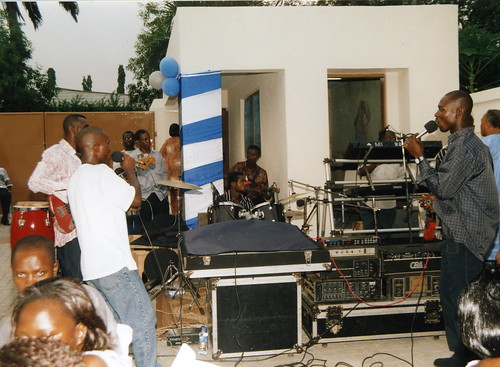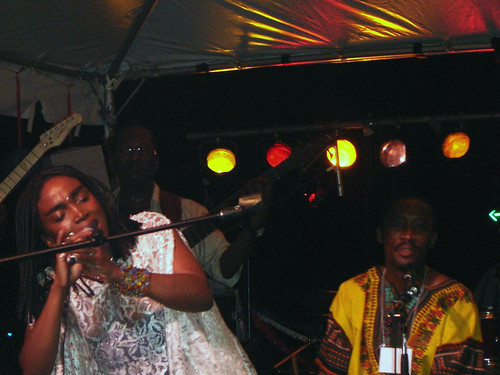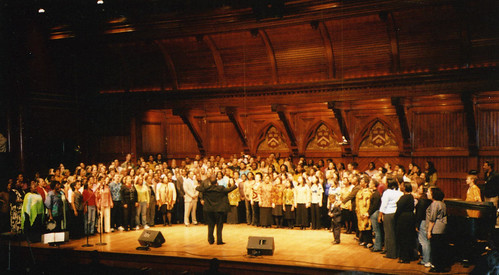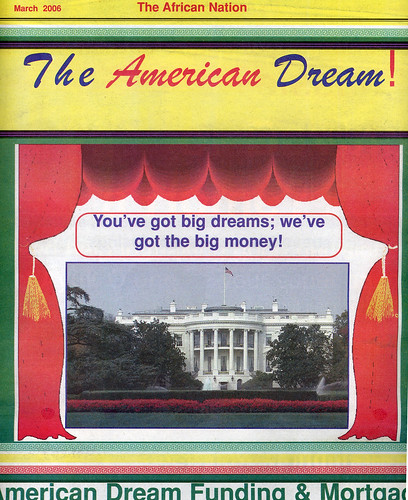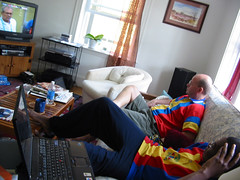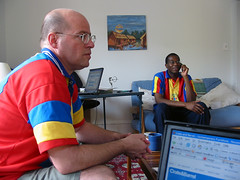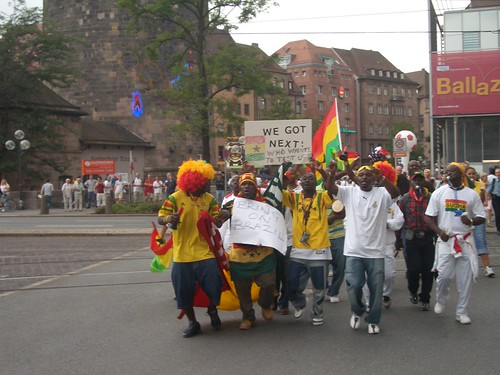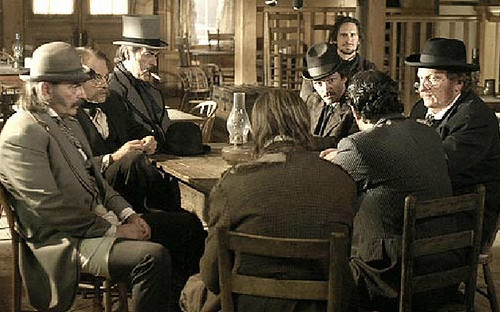Friends Today, Enemies Tomorrow
A friend was hurting very publicly the other day. The reason was friends and, as she vented, she even started reciting the cautionary lyrics of Jody Watley and Rakim's song of the same name.
Have you ever been stabbed in the backAnd its infectious chorus
By someone you thought was really cool?
Friends will let you down.And so forth. At that display, I thought I'd fulfill her request and send her the song in question. Of course my computer was falling apart as usual thus my impulse was thwarted, although I did begin to compile a playlist to cheer her up. 12 hours later, the computer seemed to have temporarily recovered, and with the benefits of a night's sleep, I decided to go beyond the dozen tracks I came up with off the top of my head.
Friend won't be around.
When you need them most, where are your friends?
Thus I give you the expanded Friends Playlist, and with it I can inaugurate a new banner in the Things Fall Apart series namely: The Comfort Suite. Said suite of course started with Mind the Gap and Comfort Food and Rare Groove. The theme of the playlist should be obvious: a musical head nod to the ties that bind as things fall apart.
Friends: A Playlist
It is fitting that we start with Friends, the most enduring hit of Jody Watley's greatest solo effort, her 1989 album, Larger than Life. It has aged better than the other songs that reached the top of the charts because of its subject matter.
As she sings, "I'm talking about your friends", and she delves into the pitfalls of the subject with her customary aplomb, a terrain where envy and deception sometimes reign. And then right on cue, The R, Rakim Allah himself, at the peak of his influence, drops knowledge with a controlled verse of worldly wisdom. All you have to say is "Friends are hard to find" and any hip-hop head will complete the line for you "so be careful" and go on from there. This is the prototype of the hip-hop soul that now permeates the charts and it works better than almost all of them because it is so balanced. The then reigning Queen of Soul met with the Crown Prince of hip-hop and their child was royalty. Andre Cymone's production is straight out of the Minneapolis Sound and the result is the perfect soul, hip-hop and pop song. Serendipitously a lesson from Jody Watley was discussed just on Friday; something must be in the air about this song.
Earlier on in her career with Shalamar in which she teemed up with Howard Hewett, she also had a hit with a different version of Friends thus this a topic that motivates our Jody.
Whodini too have a nice anthemic and bouncy version of Friends which can still turn a dancefloor alive. Old School hip-hop developed out of house parties and park gatherings of friends thus their take on Friends emphasizes the bonding rituals that prevail.
We are both Ghanaians, and on a nationalist high at the moment, hence we can turn to some glorious highlife from the motherland. The centerpiece of the playlist comes courtesy of the Beach Scorpions wonderful Friends Today, Enemies Tomorrow. At almost ten minutes, this song is the definition of sublime: the shifting and unhurried drums, the tongue-in-cheek chorus, the light and intricate guitar fills that float around. Every lyric is repeated twice since the tale is cautionary. Call and response is part of our traditions, and we firmly believe that there is joy in repetition as far as these life lessons go. (Some kind soul uploaded it to youtube for your listening pleasure.)
Judge for yourself as the pidgin stylings and folk wisdom pour forth from the first line on
Don't disgrace me, what I do for you?
I do you good, but you can't remember
You know that, life is up and down
Wherever your are, wherever you are
oh my sister, oh yes. Oh my brother, oh yes
Friends today, Enemies tomorrow
Friends today, Enemies tomorrow
The matter gets complicated and we enlist onlookers in this affair
Mr Frankie, listen to my matterThe case is well stated but then since Ghanaians wear their religion and politics on their sleeves, we get the invocation of the Golden Rule.
Oh Brother Frankie, this is my matter
The time I get my money, I used to go without
The time I get my money, I say, I tell em it be for them
They don't remember what I do for them sometime ago
Oh my sister, what I do for them oh yes.
Friends today, Enemies tomorrow
Friends today, Enemies tomorrow
Love your neighbour as you love yourself
Wherever you are, wherever you are. Oh yes.
Oh my sister, wherever you are, oh yes.
Oh my brother, wherever you are, oh yes.
Anthony Scorpion's plaintive voice meshes well with the mandolin and clarinet that punctuate the music. I defy you to keep from nodding your head or smiling to this laidback song and, well let me go for hyperbole, superb piece of liberation highlife.
The Beach Scorpions might well have been singing about Donald Rumsfeld. He too was so inconsistent when it came to Saddam, Friends Today, Enemies Tomorrow is the theme song for the Axis of Hypocrisy. It's funny what a little Black Gold can do to these friendships of ours.
There is another reading of the song however, which is that Brother Scorpion was playing a Kweku Ananse ruse, and all this palava was a veiled appeal for money. The clue is in the line "They don't remember what I do for them sometime ago". "Sometime ago" is awfully imprecise and perhaps it is that he is basically broke and lazy and consequently trying to appeal to one's sense of shame (the word "enemies") and foggy memory ("they don't remember") in order to get some unearned cash. Well that's the paradox of friends today, enemies tomorrow.
The Beach Scorpions know all too well what Jealousy can cause and they sing to their wives
Jealousy will kill you, take your time,Again there is considerable mischief in their singing. One wonders if the jealousy wasn't a little deserved as these guys run around town with the groupies that every musician typically garners.
Watch yourself. Oh my wife...
Look your face in the mirror
You'll see that you'll grow lean
Musically close to Jody's track is Rumors by Timex Social Club from the aptly titled Vicious Rumours album.
Sometimes it is simply a matter of Games as Chuckii Booker would have it, and he should know given that he was Turned Away earlier in his career. Mark Morrison interpolated that song with Return of the Mack and maybe Macks, and the games they play, are the root cause of our problems with friends.
Jonathan Butler chimes in with Lies
Wish I could have seen it in your eyes.As do the Thompson Twins if you prefer your lies served as New Wave pop.
Lies. But I never did... realize.
Prince will oblige with Old Friends for Sale but you can always make new ones, at least that has been my experience. But if you do want to hang on to them, Prince's case is instructive and indeed he eventually reconciled with those who made him sing those heady words:
The sun set on my heart this eveningDonnie recently sang You've Got A Friend in The Colored Section which sounds reasonable enough.
For someone who said they would die for me.
I won't mention Dionne Warwick singing That's What Friends Are For since you presumably know that what you want out of friends often isn't what you get.
The Dramatics however claim that What You See Is What You Get, but that is dubious when one considers the vagaries of the human factor.
And how about Vesta Williams with the infectious Once Bitten, Twice Shy which was contemporaneous with Jody and Rakim's take.
And for a good mix from the same era how about Robbie Nevil's wonderful slice of pop life: C'est la vie. The chorus:
C'est la vieAnd while on that same theme, how about Earth Wind and Fire's That's The Way Of The World. I'm always happy after I listen to that one especially the live version. An anthem for the hard knock life that Oliver (by way of Dickens), Annie and Jay-Z know about. One really needs to hang in there under the circumstances.
C'est la vie
That's just the way it goes
That's life
As Ruby Turner sang in that neglected UK soul album produced by Womack and Womack, It's Gonna Be Alright. The Blacksmith remix was my friends' soundtrack back in 1989.
We must be mindful of what The O'Jays termed Shiftless, Shady, Jealous Kind Of People but your mileage may vary. This, of course, was part of their Back Stabbers album and the title track is often relevant in friendships.
Brenda Russell and her then husband sand a duet on Please Pardon Me (You Remind Me Of A Friend). Was that prescience about their later break up? Who knows, but you wonder sometimes whether life imitated art or if it was the reverse. She also later followed up the pragmatic soul anthem In the Thick of It and the message was "better get a grip and get it on".
Harold Melvin and the Blue Notes pose the question as follows: Where Are All My Friends?
Fried provide the answer with Friends in Lo Places. Those who know, know Fried. Jonte Short is down low, and with that unique voice of hers, gives us a soulful notion of Portishead by way of Memphis and the Fine Young Cannibals. Her voice is languid and bluesy; the song is great, what else can I say.
Gary Numan asks Are Friends Electric. He is our greatest electro-pop auteur.
Cheryl Lynn notes that it's Got to be Real (although that more properly belongs in a love playlist if you want to be a pedant about these things).
Donny Hathaway reprises The Beatles' Jealous Guy and gives it soul flavour, the music that is, not the jealousy which is the eternal temptation ever since Cain.
Colonel Abrams lets bygones be bygones but rues How Soon We Forget. He also had that dancefloor groove of Trapped but that is not quite appropriate here.
You Remind Me courtesy of Patrice Rushen is wistful and has been sampled to death. It's no wonder Prince was in love with her although she was the one who got away. And what a voice, her appeal is Straight From the Heart
Count Basie's Orchestra was all about Dinner With Friends in those late night jook joints that were the essence of swing.
Charlie Parker insists with typical lyricism that Just Friends should be invited to said dinner. Bird was a sensitive soul who couldn't suffer fools. Unfortunately when it came to his addictions he didn't follow his advice.
Abstrac's I'll Be Your Friend features Bernard Bell and is full of reassurance.
The Winans sing about A Friend, a simple gospel tune from a band of brothers produced by Teddy Riley with his customary keyboard work. "There is a friend that sticks closer than every brother". The Quakers, that original Society of Friends, would no doubt nod their heads to that message.
Donny Hathaway returns with We're Still Friends through the ups and downs.
Eddie Kendricks gets more precise on the nature of the friendship with a song called Intimate Friends. Those are the best ones, the ones that go beneath the surface.
Ella Fitzgerald and Louis Armstrong playfully debate gentle letdowns in Can't We Be Friends. They resolve things amicably, well who can deny Satchmo?
Simply Red have a partial answer to that question namely sometimes Money's Too Tight to Mention
Oh money, money, moneyTruer words have never been sang.
We're talking about Reaganomics...This is my favourite song from Mick and the boys, and the album cover shows him as an Oliver Twist in the making since trickle-down and supply-side mantras leave much to be desired in the world commons. Nay they lead to the poorhouse, or is it Bleak House, Hard Times and worse? The song, and Dickens, remain very relevant today it is sad to say. Heck it's enough to make Warren Buffett Turn Against God.
We're talking about money, money
Yeah, money, money. Oh money, money.
We're talking about the dollar bill
And an old man that's over the hill
Now what are we supposed to do?
Full Force with Friends B-4 Lovers are typographically innovative and put friendship B-4 sex which is a sound strategy for lasting relationships (and safe sex).
Gladys Knight and The Pips invite us to get on board the Friendship Train. On the other hand they also sang about catching that Midnight Train to Georgia and that was their more enduring musical legacy. Hmmm.
Again going back to Ghana, we turn to Guyoyo whose electric highlife inveighs against Osikuni Atamfo (Gossiper Enemies)
Annie Lennox of Eurythmics posited that There Must Be An Angel playing with her heart and who can blame her. One hopes it wasn't her compere, Dave Stewart. The heavenly chorus: "Must be talking to an angel".
She should have listened to Jonathan Butler's Melodie, a soothing instrumental guaranteed to ensure soul survival.
Those southern knights known as The Crusaders, erstwhile of Street Life fame, want us to "Keep on, Keep that Same Old Feeling". Those good old days of pure friendships and southern comfort...
Best Of Friends by Lenny White is a classic bit of jazz-funk, a celebration of those that enrich our lives.
Biz Markie's Just a Friend is about betrayal sang in an off-key voice
Baby youJonathan Butler is quite the flirt with More Than Friends, the title track of his 1988 album which saw him continue with the themes of lies. The album features the then-ascendant Teddy Riley to liven things up a little.
Got what I need
And you you say he's just a friend
And you you say he's just a friend
Surface cut to the chase, they want to be Closer Than Friends. I've always thought it was just a seductive come-on and the song certainly sounds that way, but perhaps they are just echoing the words of The Godfather, Michael Corleone that is, namely
Keep your friends close but your enemies closerMichael Jackson is Just Good Friends with Stevie Wonder. There were hysterical concerns about the nature of some of MJ's later friendships but really they are pure ones, even judicially certified. Judgment matters when it comes to friends you need to figure out who's bad.
Musiq Soulchild is more concise with Just Friends (Sunny). An optimistic song about yearning and wanting to hang out without hidden agendas. If only it was always so.
S.O.S. Band deliver the message of the hour with the exuberant Just Be Good to Me. The full flowering of Jam & Lewis's take on the Minneapolis Sound was in the irresistible grooves they wrote for the S.O.S. Band and they never looked back. We all need the occasional SOS Band.
Chubb Rock provides some sound advice in Treat Em' Right. As the saying goes:
The Fat Lady sangFather MC retorts that you should Treat Them Like They Want To Be Treated to the sounds of Jodeci's chorus. He's upset about those who act all warm and cuddly only to play around with his mind when his guard is down. It is only later that he adds "you should treat them right" and it is almost an afterthought.
I crushed her
Word up The Chubbster
Prince wants to be friends and not just your boyfriend. I remember the LoveSexy tour in 1988/89, when he would sing If I Was Your Girlfriend and bring the house down with its minimalist Linn drums and Camille voice. And there was that bed on the stage business to add to the sexual confusion.
Me'Shell NdegéOcello takes no prisoners and even delivers some playground taunts
If that's your boyfriendThat's a bit harsh but such is the life of Plantation Lullabies; this is the school of hard knocks that we are talking about. It's enough to Make You Wanna Holler as she sang in the Peace Beyond Passion album not coincidentally released on the Maverick label.
If that's your boyfriend
Then he wasn't last night.
Jaguar Wright goes Woman to Woman and has a chat with someone who happens to be sharing her man. Some friendships are born of dysfunction and co-dependency but we are nothing if not social beasts.
Pebbles in Girlfriend takes up the time-honoured task of the concerned friend who witnesses a break up and mixes harsh truths
Girlfriendwith the kind words that befit a good pep-talk
How could you let him treat you so bad?
Uh oh.
You know you were the best he ever had. Oh ohShe even gets all existentialist quoting The Bard, Shakespeare that is, by way of Hamlet
To be or not to be. That is the question.She adds the urban analysis
It just takes a street degree.And then comes the chicken grease of the song:
You cried your last cryIf only I could count the number of times my female friends have sang those words to my face, and with a quite vicious intent in their face and voice. L.A. and Babyface broke through commercially with their production on this song and never looked back since. Incidentally if memory serves me right, Pebbles's words of wisdom got her married to L.A. Reid.
I've lied my last lie.
I'm out the door, Babe
There's other fish in the sea.
Ronnie Laws gives us Friends and Strangers, soothing jazz funk for two-faced operators. "Doublé" as I used to say in secondary school. If you care, the remix by Madlib is infused with some fiercesome drums.
On the pure jazz front we can turn to Sonny Rollins's version of Just Friends. When Rollins plays for Bird you know its all about friends
Tina Turner boldly states that What You Get Is What You See and, well, Ike Turner didn't hold anything back in their relationship. He was like Jody Watley, larger than life.
Samuelle's So You Like What You See is the missing link of the New Jack Swing movement and is graced by one of Teddy Riley's best songs. "You better get with the program". Incidentally this album was available for 6 cents on Amazon. I bought another copy to send to a friend. Really there's one great song there, it's worth your time.
We then turn to War's Why Can't We Be Friends and this gets us into matter of politics; maybe those neocon rogues could listen to this tune. It's not a zero-sum game, and the prisoner's dilemma will only put us on The Road to Guantanamo Bay.
Amel Larrieux sang Get Up a few years ago to motivate her friends about the Infinite Possibilities in the world. By the way some friendly advice from your lowly DJ, her new album is the truth, run to your record store or iTunes as appropriate.
Jonathan Butler pleads Take Me Home, another instrumental track from More than Friends. He was sorely missing his friends in South Africa living all those years in the US as he did. People like to forget apartheid and downplay its human costs but they are still with us, and this song provides musical evidence. The most talented musicians were forced into exile and, even if some landed well like Butler did, it is worth remembering all those friendships that had to be put on hold for P.W. Botha, De Klerk and those other rogues.
Isaac Hayes, Black Moses himself, preaches about A Friend's Place and one hopes friends don't get the Shaft.
Tweet sings Best Friend with Bilal who reciprocates with Soul Sista. Bilal too turned in an unreleased version of Prince's How Come You Don't Call Me Anymore? which is far better than Alicia Keys' take. Of course Bilal is the greatest jazz singer to play the soul scene. As Marc Anthony Neal put it in Songs in the Key of Black Life, Bilal quite literally pimps the microphone.
Kirk Franklin on the other hand received A Letter From My Friend a graceful gospel ballad. He certainly knows how to put a choir to good use.
Vesta Williams' Congratulations is about that quite common emotion termed Schadenfreude. The occasion is her being informed of a friend's impending marriage, it's about the one who got away. Thus she wails
Congratula-a-a-a-a-a-a-tionsAnd so forth. She also has that Relationships album for a full length treatment of such matters.
I thought it would be me
Standing next to you
Cameo contribute one of their rare ballads to this soundrack: Friend To Me. The interplay between the voice and the horns make this delicate song a great testimonial. Sometimes however, they get pointed and will come back with You're Talking Out The Side Of Your Neck on the She's Strange album.
Eddie Kendricks explains that He's A Friend Of Mine, Eddie is one of those Temptations who Keeps on Truckin'.
The Hollies make it a matter of family with He Ain't Heavy (He's my Brother) and again we turn to Donny Hathaway's version which is full of the pathos the song deserves.
Donny Hathaway also contributes You've Got A Friend which he reprised in his duet album with Roberta Flack.
In the same vein we can turn to Rodgers and Hammerstein's You'll Never Walk Alone from Carousel, a song beloved by Liverpool football fans all over (speaking as one). It builds the tribal connection quite effectively. Nina Simone's instrumental version is poignant and reflective on Little Girl Blue, her big coming out party whose fortieth anniversary is right around the corner.
Incognito, the acid jazz pioneers, intone that you're Still A Friend Of Mine and more will be forthcoming on said group and genre.
Van Hunt recognizes Suspicion (She Knows Me Too Well). You can't hide certain things from good friends even if you try. There's also the bit about being Down Here in Hell (With You).
Les Nubians and Morgan Heritage mix France, Congo, Jamaica, French and English and ask Brothers and Sisters to "give thanks a praise to the Almighty".
Zap Mama get to Yellin' Away with Talib Kweli and Common in the camaraderie of Ancestry in Progress.
I've previously discussed Cherrelle singing My Friend in the context of her affair with Randy Ran and friendships are things that endure at Home.
And apropos affairs, Sade claims that she's not one to Turn My Back On You.
To raise the feelgood quotient, I suppose we can include Bill Withers' Lean on Me. Perhaps though we should try the funky version of that song done by Club Nouveau, the revamped Timex Social Club in that album about Life, Love & Pain you can't go wrong with that song. The boys also had a hit with Jealousy and perhaps that is part of what is up in these cases.
Zhané know that it's all about the party and the need to unwind.
I am ready to call my friendsIf I'm asked this nicely, I try to deliver. Renée Neufville continued her collaboration (and presumably friendship) with Roy Hargrove and gave us "Drop it On the One"
So we can all get down
With the party
Hey Hey, Mr DJ
Hey Mr DJ
You can get this started
Aretha Franklin is a preacher's daughter and goes back to the source in What A Friend We Have In Jesus, a song performed with such Amazing Grace.
Earth, Wind & Fire are soulful prophets and say that you should Keep Your Head To The Sky. The live version of course is coupled with Devotion and that's what we seek of our best friends.
De La Soul enlist the Native Tongues with Buddy. The remix takes Tanaa Gardner's Heartbeat and turns it into a collective exercise in celebrating friendships. It features the Jungle Brothers, A Tribe Called Quest, Monie Love and Queen Latifah and embodies the best of hip-hop.
The end of this playlist will be Friends To The End by Wreckx-N-Effect. Featuring the Redhead Kingpin (of Do the Right Thing fame), this is the best that those Soul Men released. On an album that introduced the New Jack Swing, and foreshadowed Rump Shakers and such, this was the standout track. A posse cut is all about friendship and they oblige with verbal dexterity, wit and that ineffable feeling we call kinship. The first line states the thesis: "We've had the peanut butter now it's time for the jelly". We've gone from Friends Today, Enemies Tomorrow to Friends to the End.
I'm sure you have your own favourite songs about friends and I'm sure the suggestions will be forthcoming and they are welcomed. I called it quits at around 100 songs. In any case, it will be a while longer before I can add to this list: the computer gave up the ghost right after I burned the cd (and possibly for good). As they say things fall apart. Still I hope I managed to give some comfort in this suite.
Hang in there Bubu. The cd is in the mail.
P.S. I'll happily burn some more cds when I get the new computer.
Friends, a Playlist
File under: music, obsession, friends, friendship, communities, music, relationships, comfort, glue, Ties That Bind, whimsy, humour, playlist, soul, highlife, hip-hop, jazz, Ghana, Africa, comfort, observation, money, jealousy, Dickens, Comfort Suite, Things Fall Apart, toli

